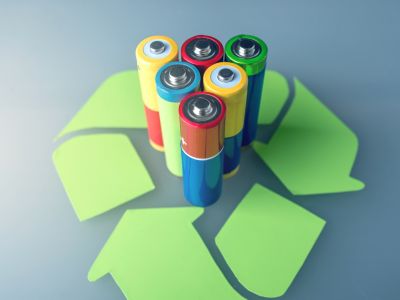Lithium-Ion Battery Recycling Solutions
We are a global provider of lithium-ion battery recycling solutions, including the supply of battery scrap, recycled battery metals and black mass. Our expertise lies in delivering environmentally responsible recycling solutions that maximize the recovery of valuable materials.
We work closely with battery manufacturers, developers, and research labs to develop innovative recycling supply chain solutions for markets around the world. By optimizing material recovery and reducing waste, we contribute to the circular economy and help mitigate the environmental impact of battery disposal.
Our Solutions

Recycled Battery Metals
Aluminum, copper, cobalt, nickel and lithium recovered at high purity as the battery metal precursors through a green hydro-metallurgical process.

Black Mass
Black mass is the valuable residual compound formed by shredding li-ion batteries that have reached the end of their usable life cycle.
Battery Recycling
At our core, we recognize the importance of optimizing battery recycling processes to unlock their full potential. By recovering valuable materials and minimizing waste, we contribute to the circular economy while addressing the key aspects of battery performance, such as suitable discharge rates, safety, and cost-effectiveness.
Can lithium batteries be recycled?
Lithium batteries, including lithium-ion and lithium-polymer batteries, are highly recyclable due to the valuable materials they contain. These batteries often comprise metals such as lithium, cobalt, nickel, and copper, which can be recovered and reused in the production of new batteries, reducing the reliance on virgin resources.
Battery Recycling Process: Unlocking the Power of Sustainability
Battery recycling is a pivotal process that breathes new life into end-of-life batteries, unlocking the power of sustainability while mitigating environmental impact. This intricate process involves several key steps, each designed to maximize material recovery and minimize waste.
- Collection and Sorting: The journey begins with the collection of used batteries from various sources, including consumer electronics, electric vehicles, and industrial applications. These batteries are sorted based on chemistry, size, and type to ensure efficient recycling.
- Battery Disassembly: Next, the batteries undergo disassembly, where they are carefully taken apart to separate different components. This step allows for the isolation of valuable materials, such as lithium, cobalt, nickel, and other metals, which can be reused in the production of new batteries.
- Shredding and Crushing: Once disassembled, the batteries enter the shredding and crushing stage. Here, they are processed into smaller fragments or crushed into fine particles. This facilitates the separation of different materials and exposes the inner components for further processing.
- Chemical Treatment: The shredded or crushed battery fragments undergo a chemical treatment process. This involves using various techniques, such as leaching or precipitation, to extract specific metals and materials. Through this process, the valuable metals, including lithium, cobalt, nickel, and copper, are separated for recycling.
- Purification and Refining: After the chemical treatment, the extracted metals go through purification and refining processes. These processes remove impurities and enhance the quality of the recovered materials, ensuring they meet the stringent requirements for reuse in battery manufacturing.
- Reincorporation and Manufacturing: The purified materials are reintroduced into the battery manufacturing cycle, where they are utilized to create new battery components. By incorporating recycled materials, manufacturers can reduce their reliance on virgin resources and contribute to a more sustainable supply chain.
- Safe Disposal of Residual Waste: During the recycling process, certain materials that cannot be effectively recovered are treated as residual waste. These materials are disposed of safely, following strict environmental regulations, to prevent any adverse impact on ecosystems and public health.
- Environmental Monitoring and Compliance: Throughout the entire battery recycling process, environmental monitoring and compliance play a crucial role. Strict adherence to regulations ensures that the recycling facilities operate in an environmentally responsible manner, safeguarding air and water quality while prioritizing worker safety.
By embracing advanced recycling technologies, innovative processes, and robust quality control measures, the battery recycling industry is transforming waste into valuable resources. This sustainable approach not only conserves raw materials but also reduces greenhouse gas emissions and lessens the need for new mining operations.
Join us in the pursuit of a greener future, where battery recycling plays a pivotal role in shaping a circular economy and driving the sustainable development of energy storage technologies. Together, let’s harness the power of battery recycling to create a more sustainable and resilient world.
Where to recycle batteries?
When it comes to recycling batteries, it’s important to find the right facilities and services that prioritize environmental responsibility and efficient resource recovery. One option for battery recycling is Targray, a company that offers comprehensive battery recycling solutions.
At Targray, we understand the significance of proper battery disposal and the need to recover valuable materials while minimizing waste. Our company is dedicated to providing sustainable and environmentally conscious battery recycling services. We work diligently to ensure the safe handling and processing of various types of batteries, including lithium-ion batteries commonly found in consumer electronics and electric vehicles.
To recycle your batteries responsibly, we recommend exploring local options such as municipal recycling centers or authorized collection points. These locations often have designated drop-off points where you can safely deposit your used batteries for recycling. Some retailers and electronic stores also offer battery recycling programs, making it convenient for consumers to participate in responsible disposal practices.
However, for larger quantities or specialized battery recycling needs, partnering with a professional recycling service like Targray can offer additional benefits. Our company provides expertise in battery recycling processes, advanced technologies, and robust quality control measures to ensure efficient material recovery and proper disposal of residual waste. We work collaboratively with battery manufacturers, developers, and research labs to develop innovative recycling solutions that meet industry standards and environmental regulations.
When choosing a battery recycling service, it’s important to consider factors such as the company’s experience, certifications, and commitment to sustainability. Look for a service provider that prioritizes environmental protection and can handle the specific types of batteries you need to recycle.
Remember, recycling batteries not only conserves valuable resources but also helps prevent potential environmental harm caused by improper disposal. By making the conscious choice to recycle your batteries, you are contributing to a cleaner and more sustainable future.
Whether you opt for local recycling programs or seek professional recycling services like Targray, taking that extra step to recycle your batteries demonstrates your commitment to environmental stewardship. Together, let’s make a difference by responsibly recycling batteries and shaping a greener world for generations to come.
Creating Value from Battery Recycling
Our battery recycling solutions are tailored to meet the demands of diverse industries, including cell manufacturers, battery pack producers, and electric vehicle companies. Backed by Targray Group’s substantial financing capabilities, we offer customers the necessary flexibility to maximize value and drive growth.
With allocation agreements in place with top recyclers, we ensure the efficient management of long-term recycling contracts. Our comprehensive supply chain solutions encompass various trade finance and inventory management programs, empowering businesses to streamline their recycling operations effectively. Choose our recycling services to unlock the full potential of sustainability while benefiting from our expertise and financial support.